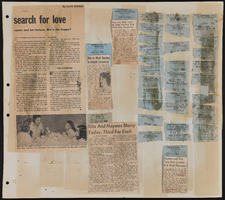Search the Special Collections and Archives Portal
Search Results
Janet Savalli oral history interview
Identifier
Abstract
Oral history interview with Janet Savalli conducted by Irene Rostine on September 21, 1996 for the Women's Research Institute of Nevada (WRIN) Las Vegas Women Oral History Project. Savalli begins her interview by discussing her move to Las Vegas, Nevada as a child in 1945. Savalli then goes on to discuss her 46 year long career at the Southern Nevada Telephone Company. She describes rising through the company starting as an operator and ending as a community relations coordinator. Savalli discusses the company's merger with Sprint and the changes this brought about including the creation of a union and wage and benefits changes. Savalli ends her interview by talking about atomic testing, and how the testing grew to be a part of Las Vegas culture at the time.
Archival Collection
Ann Valder Papers
Identifier
Abstract
Ann Valder Papers (1963-1984) include agendas and minutes, programs, invitations, events, and newspaper clippings. The papers are limited to the time Valder spent working for the Review Journal and the Valley Times in Las Vegas, Nevada. The activities covered are her work with Southern Nevada Memorial Hospital and the American Cancer Society.
Archival Collection
Nevada Hotel and Motel Association Collection
Identifier
Abstract
The Nevada Hotel and Motel Association Collection contains items from the hospitality and service industries from 1979 to 1992. The collection consists of trade publications, conference brochures, and industry reports focusing on the service and hospitality industries in Nevada.
Archival Collection
Gerald L. Connor oral history interview
Identifier
Abstract
Oral history interview with Gerald Connor conducted by James Bonnell on February 22, 1977 for the Ralph Roske Oral History Project on Early Las Vegas. Connor first discusses moving to Las Vegas, Nevada and serving as a pilot in the United States Air Force. He then discusses his education at the University of Nevada, Las Vegas and his church membership. Topics that Connor discusses during the interview also include changes in the school district and properties located in Downtown Las Vegas and the Las Vegas Strip, his political activity within the Democratic Party, the Helldorado Parades, and the early atomic tests at the Nevada Test Site.
Archival Collection
Luceanne "Lucy" Taufa oral history interview
Identifier
Abstract
Oral history interview with Luceanne "Lucy" Taufa conducted by Jerwin Tiu, Cecilia Winchell, and Stefani Evans on December 16, 2022 for Reflections: the Las Vegas Asian American and Pacific Islander Oral History Project. In this interview, Taufa describes growing up on the Tongan island of Vava'u in a large family and later immigrating to the United States. She recalls her father first immigrating to Hawaii, and after obtaining a green card, her and her siblings following shortly after. While Kaufa's older siblings continued to pursue higher education and her younger siblings were too young to work, she took on a bulk of the responsibility to provide income and navigate life in Hawaii for her family. Eventually, Lucy moved to Dallas, Texas, met her husband, and moved to Las Vegas, Nevada for her husband's job. Later in the interview, she discusses joining the Culinary Union after experiencing racial discrimination at her workplace and her pride in her identity as a Tongan woman.
Archival Collection

Rodrigo Vazquez oral history interview: transcript
Date
Archival Collection
Description
Oral history interview with Rodrigo Vazquez conducted by Nathalie Martinez and Barbara Tabach on May 24, 2021 for the Latinx Voices of Southern Nevada Oral History Project. Rodrigo was raised in a mixed status Mexican family. He was born in Mexico and immigrated to the United States at the age of three, later becoming a citizen when he was in the 8th grade. Rodrigo is currently a graduate student worker for the Latinx Voices Oral History Project and reflects on what he has learned. He also discusses what the past year of the Coronavirus pandemic has been like for him. Subjects discussed include: Latinx and Mexican identities, COVID-19 era, and Latinx Voices Project oral historian.
Text

Maria Casas interview, June 12, 2019: transcript
Date
Archival Collection
Description
Interviewed by Maribel Estrada Calderón. Farmersville is described as a small town between, Exeter and Visalia, California populated by Mexican American farm workers. It is in this small town, where UNLV History Professor Maria Raquél Casas spent her childhood raised along with her sisters and brothers. In her interview, Dr. Casas describes how growing up in this small town with her traditional Mexican family influenced the person she is today. While working alongside her family in the fields, Dr. Casas decided that she would strive to obtain an education. Through hard work and constant support from her sister, Dr. Casas attended Fresno State, where she discovered her love for history. Upon completing her undergraduate program, Dr. Casas made the decision to further her education by pursuing a master's at Cornell University. At Cornell, she faced discouraging professors who believed she would not be able to complete the master's program let alone pursue a PhD program. Despite these demoralizing professors, Dr. Casas completed her program and was admitted into University of California Santa Barbara's history program. Dr. Casas never forgot her roots or the significance of her presence in the majority white academic spaces she attended during her academic journey. When she arrived at UNLV, she continued to strive for more Latino representation in both the student population and in the school faculty. During her tenure at UNLV, Dr. Casas has served as an advisor for multiple Latino student organizations including MEChA and SoL. Dr. Casas has witnessed much progress in Latino representation at UNLV, but she believes there is still much work left to be accomplished.
Text

Transcript of interview with Florence McClure by Joanne Goodwin, January 24, 1996 & February 6, 1996
Date
Archival Collection
Description
Florence McClure came to Las Vegas later in her life, but the state felt her presence and the community her contributions as if she were a native daughter. Introduced to the League of Women Voters in 1967, McClure met her political mentor Jean Ford and learned how to practice the core elements of democracy. She put those tools to work in a number of ways, however her participation in the creation of the Rape Crises Center and her advocacy for locating the women’s prison near Las Vegas are two of her long-lasting efforts. Florence Alberta Schilling was born in southern Illinois where she enjoyed the security of a tight-knit family and the independence to test her abilities growing up. She graduated from high school and attended the MacMurray College for Women at Jacksonville. With the attack on Pearl Harbor in 1941, she began a series of jobs working for the war effort. She moved to Ypsilanti, Michigan with a girlfriend to work at the Willow Run Army Airbase and then moved to Miami, Florida where she worked for the Provost Marshall in the Security and Intelligence Division. She met her husband, James McClure, at the time and they married in 1945. During the next several years, they raised a family and moved around the country and to Japan with the military. McClure came to Las Vegas in 1966 as part of her work in the hotel industry which she engaged in after her husband’s retirement from the military. She had worked in California and Miami Beach, but it was Burton Cohen in Los Angeles who invited her to join him in a move to Las Vegas to build the new Frontier Hotel and Casino. Following the completion of the Frontier, she moved to the Desert Inn with Cohen in 1967 and worked as the executive office manager. After a few years, she decided to leave the industry and complete her college education. She graduated from UNLV in 1971with a BA in Sociology with an emphasis on criminology. She was 50 years old. McClure had been a member of the League of Women Voters for a few years at that point and had learned the political process from Jean Ford and workshops on lobbying. She had numerous skills that were waiting to be tapped when she attended an informational meeting on the incidence of rape in the Las Vegas valley. From that meeting, a small group of individuals, including McClure, began the organization Community Action Against Rape (later renamed the Rape Crisis Center) in 1973. It was the first agency in the area devoted to serving individuals who had been assaulted and changing the laws on rape. The organization’s first office was set up in McClure’s home. Over the next decade, she worked to change attitudes and reshape policy by constantly raising the issues of sexual assault with police officers, emergency room doctors, judges, and legislators. Her role as an advocate took her into hospital emergency rooms and courtrooms to assist victims. It also took her to the state legislator to lobby repeatedly for a change in laws. During this period, journalist Jan Seagrave gave McClure the nickname “Hurricane Florence” - a fitting moniker that captured the force with which McClure attacked the issue. As a result of her efforts and those of the people with whom she worked, we now 1) recognize rape as a crime of assault; 2) forbid the sexual history of a rape victim from being used against her in court; and 3) recognize marital rape. In addition to learning about Florence McClure’s activities, the reader of this interview will gain information on the role of civic organizations like the League of Women Voters in engaging the voluntary efforts of women in the post-war years.
Text
Transcript of interview with Hank Greenspun by Perry Kaufman, 1975
Date
Archival Collection
Description
Hank Greenspun discusses coming to Las Vegas in the 1940s, his journalistic endeavors, and some of the politics that affected him.
No release form is on file for this interview. The interview is accessible onsite only, and researchers must seek permission from the interviewee or heirs for quotation, reproduction, or publication. Please contact special.collections@unlv.edu for further information.
Text

